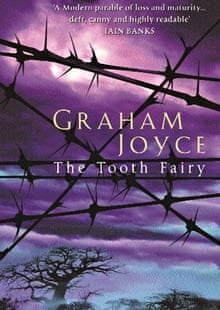The work of Graham Joyce, the prizewinning author of more than a dozen horror and dark fantasy novels, who has died of cancer aged 59, was largely unacknowledged in the world of mainstream literature, but his books and stories were extraordinarily successful, winning him a huge and admiring popular readership and many awards. The British fantasy award is a considerable accolade because it is voted on by fellow professionals as well as readers. Graham won it six times, and was nominated several times more. He was also a past winner of the prestigious World fantasy award.
Five of his titles are currently in development as feature films with various producersHis work was always unpredictable and varied in its settings and themes. He disliked repeating himself, and his writing often benefited from an easy, naturalistic style and a familiarity with ordinary life. His depiction of British families and attitudes strikes a note many UK readers quickly recognise, and which possibly postponed for a few years his success in the US. However, American readers, once his books reached them, were enthusiastic. Perhaps they too relished the other quality of Graham's writing, which was the way these homely settings suddenly burgeoned into fantasy worlds, impressive and detailed in their imaginative depths.
His best-known novel is probably The Tooth Fairy (1996), in which a boy's accidental sighting of the legendary sprite wreaks havoc on house and home, and his coming of age. Graham's achievement in this novel is his complete subversion of our cosy image of the nocturnal visitor, as well as the metaphorical treatment of puberty. Similarly unexpected is a more recent novel, Some Kind of Fairy Tale (2013), in which a teenage girl, lost to the family 20 years earlier, returns one Christmas Day with the claim that she was taken by the fairies.
Many critics believe one of his best books to be his ninth novel, The Facts of Life (2002). Set in postwar Coventry, at the time when the city was being hurriedly and carelessly rebuilt after its destruction by the Luftwaffe in 1940, it is the story of a young boy, possessed of special supernatural powers, who was possibly conceived on the night of the raid. The quality of writing, the detail and insight into the social background, would clearly designate it as a literary novel. But the element of dark fantasy meant that it was generally regarded as a genre novel. It delighted his thousands of regular readers, who would be unconcerned with labels, but many more people would probably have appreciated it too.

Graham was born in Keresley, near Coventry, into a family of coal miners. He grew up in a tough, male-dominant working-class society where, he said, any young man using words with more than two syllables was considered effete. He attributed the spare, economical style in which most of his fiction is written to this early influence. He failed his 11-plus, but it was only a temporary setback. After school he went to Bishop Lonsdale college in Derby, where he gained a degree in education and a teaching certificate. Later he studied at Leicester University, earning a master's in modern English and American literature, and some years after that he gained a PhD from Nottingham University.
Graham worked for several years as a training and development officer for the National Association of Youth Clubs, but in 1988 his wish to become a writer was so strong that he and his wife, Suzanne Johnsen, a law student he had met at Leicester, moved to Greece. They spent a year on Lesbos and Crete while Graham wrote his first novel, Dreamside (1991). The sale of the novel to Pan Books enabled them to continue their travels, but in the end they returned to Leicester, where Graham was to spend the rest of his life as a full-time writer.
He was a family man and had two children, now teenagers, some of whose exploits were amusingly described in his blog. Also highly amusing were his feelings about football: like Vladimir Nabokov before him, he was a goalkeeper. He played for England Writers, "a bunch of chronically unskilled middle-aged no-hopers". His book on football, Simple Goalkeeping Made Spectacular (2009), was a runner-up in the William Hill sports book of the year.
A humane, humorous, considerate and loving man, an enthusiast of the countryside and nature, Graham was an incisive observer of human foibles. He was, for instance, an opponent of Michael Gove when he was education secretary – earlier this year Graham, a lifelong educator, gathered more than 148,000 signatures for a petition to sack the Tory minister, whom he described as "singlehandedly wreaking havoc on the morale and practice of school learning".
He also went on record recently with an expert defence of the controversial 2011 Man Booker prize shortlist: the books had been criticised by the author Jeanette Winterson, who claimed narrative fiction of the sort that the judges preferred was dumbing down literature. Not at all, said Graham, in a brilliant argument based on specifics, not the generalisations Winterson had deployed. His creative writing students at Nottingham Trent University were probably used to that.
Graham's reaction to the news that he had cancer – he was diagnosed in 2013 with Mantle cell lymphoma – was unusual and uplifting. After an extreme early reaction to chemotherapy, which almost killed him, he published several essays on his website describing how cancer brought a "shocking clarity" to the subject of death, and the heroic journey necessarily taken by cancer victims. He explained that he meant: "'Heroic' in the mythical sense, in that your life is suddenly propelled along a remorseless narrative that has the structure of all great mythical journeys." For those of us who knew Graham, those final essays, exaltations of life and nature, are moving almost beyond words.
Graham was working on a new novel at the time of his death. He is survived by Suzanne and his children, Ella and Joseph.

Comments (…)
Sign in or create your Guardian account to join the discussion